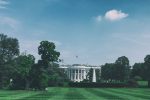The Church And The Moral Abyss Of Washington D.C.
Oct 6th, 2018 | By Dr. Jim Eckman
Ed Stetzer, who holds the Billy Graham Distinguished Chair of Church, Mission, and Evangelism at Wheaton College and is executive director of the Billy Graham Center, asks this poignant question: “How can we spiritually lead our people struggling to respond in a culture charged by political polarization and fed a diet of cable news and social media?









